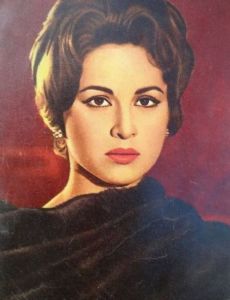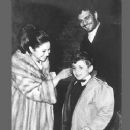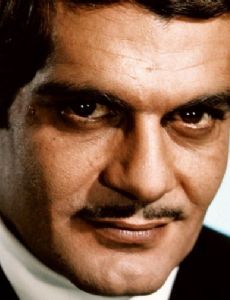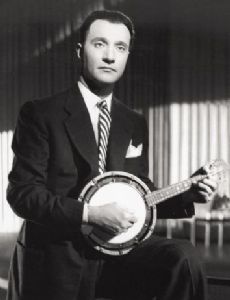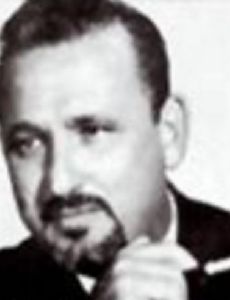Controversy in the late 1960s
Hamama left Egypt from 1966 to 1971 because she was being continuously disturbed by Egyptian Intelligence. Initially, Hamama had been a supporter of the 1952 Revolution, but later became an opponent of the Free Officers and their oppressive regime. She said they were "asking her to cooperate" but she apologized and refused. As a consequence, she was forbidden to travel or participate in festivals. She was only able to leave Egypt after many controversial disputes. She lived in Beirut and London during this period.
While she was away, then President Gamal Abdel Nasser asked famous writers, journalists and friends to try to convince her to return to Egypt. He called her a "national treasure" and had even awarded her an honorary decoration in 1965. However, Hamama didn`t return until 1971 after Abdel Nasser had passed away. Thereafter, she played critical roles conveying messages of democracy. She often criticized the laws in Egypt in her films. In the 1972 film Imbarotiriyat Meem (إمبراطورية ميم, The Empire of M), Hamama presented a prodemocratic point of view and received an award from the Soviet Union of Women in the Moscow International Festival. Her most significant film was Oridu Hallan (أريد حلاً, I Need a Solution). In this film, she criticized the laws governing marriage and divorce in Egypt. After the film, the Egyptian government abrogated a law that forbid wives from divorcing their husbands, therefore allowing khul`. [17]
In a Youssef Chahine film, Struggle in the Valley, Hamama refused to have the Egyptian actor Shukry Sarhan as a co-star, and Chahine offered Omar Sharif the role. Omar had just graduated from college then and was working with his father; Hamama accepted him as her co-star. Hamama had never accepted to act any scene involving a kiss in her career, but she shockingly accepted to do so in this film. The two fell in love and Omar Sharif converted to Islam and married her. This marriage started a new era of Hamama`s career as the couple did many of their films together. Sharif and Hamama were the romantic leads of Ayyamna Al-Holwa (أيامنا الحلوة, Our Sweet Days), Ardh Al-Salam (أرض السلام, Land of Peace), La Anam (لا أنام, Sleepless), and Sayyidat Al-Qasr (سيدة القصر, The Lady of the Palace). Their last film together, before their divorce, was Nahr Al-Hob (نهر الحب, The River of Love) in 1960.
en.wikipedia.org/wiki/Faten_Hamamaar.wikipedia.org
Date of Birth 27 May 1931, Al Mansurah, Egypt
Date of Death 17 January 2015, Cairo, Egypt
Birth Name Faten Ahmed Hamama
Mini Bio (1)
Faten Hamama (known as "The Lady of the Arabic Screen") has become an icon and the most important actress of Egyptian and Arabic cinema. She is also the most honored actress in the Middle East. Every decade of her life represents a new era of acting and witnessed the reshaping and progression of Egyptian cinema. The progress in her different characters when she started as a child in 1938 until today parallels the progress that modern Egyptian women have made during the 20th century and their interaction with the public, culture or political life. During the celebration of 100 years of Egyptian cinema on 1996, she was chosen as the country's most important actress, and 18 of her films were selected as among the best 150 made to that time. It was no surprise that in 2000 the Egyptian Organization of Critics and Writers named her the Star of the Century.
She was born in 1931 in Elmansoura, Egypt, the daughter of Ahmed Hamama, an employee of the Egyptian Ministry of Knowledge. Her legendary journey started as a secret statement between a six-year-old girl and her father after they watched a film in their neighborhood theater, at which leading actress and producer Assia Dagher was present. Faten told her father that she felt the audience was applauding for her as the leading actress, and her father gave her a hug with a vision of helping his daughter to become a movie star. She won a contest for the most beautiful child in Egypt, and her dad sent her picture to director Mohammed Karim (a pioneer of Egyptian cinema). Karim was looking for a child for his new film with Egyptian musician Mohamed Abdel Wahab. Faten auditioned for and got a role in this movie, A Happy Day (1940) ("A Happy Day"). She impressed the filmmakers so much during shooting that she was actually given more lines and scenes in the picture than were originally scripted for her. Karim put her under contract, and four years later he gave her a role in a film with Mohamed Abdel Wahab again, A Bullet in the Heart (1944) ("A Bullet in the Heart"). With her third movie with Karim, Dunia (1946), Faten showed filmmakers and audiences alike that she was was an actress ready for bigger roles. Her father, along with her family, moved to Cairo to help her in her career. She also began studying her craft at the High Institute of Acting in 1946.
With actor and director Youssef Wahby (known as the dean of Egyptian theater), Faten started a new stage of her career, in melodramas. Yousef saw her talent in Karim's movies and was able to showcase it to even better advantage in his next film, The Angel of Mercy (1946) ("The Angel of Mercy"), in which she played his daughter. Although only 15 years old at the time, it was generally agreed that she stole the film. This teenager was soon the talk of the Egyptian cinema, and her star hasn't set since then. She made more films with Wahby, such as The Secret of the Confessional (1949) ("The Chair of Confession"), in which she played a lover of the cardinal's brother who mistakenly goes to jail for her father's murder. She had another box-office hit with The Two Orphans (1949) ("The Two Orphans"), followed by a successful comedy of the travails of a wife and her mother in law in The Lady of the House (1949) ("The Lady of the House"). She was the favorite of novelists because she could attract the best writers and directors to a project, and it wasn't soon before her name alone would pretty much guarantee success for whatever film she was in.
The 1950s brought new directors to Egyptian cinema and was the beginning of what was to become known as "The Golden Age of Egyptian Cinema". Faten appeared in a number of films by these new directors, such as Salah Abouseif's first realism picture, Your Day Will Come (1952) ("Your Day Will Come"), which was a box-office hit and was shown at the prestigious Cannes Film Festival in France. She appeared in such successful films as The Barred Road (1958) ("The Barred Road") and won a Best Actresss award for her performance in the romantic political movie No Time for Love (1963) ("No Time for Love"). She also supported director Youssef Chahine in his first movie, Father Amine (1950), then again in his even more successful Siraa Fil-Wadi (1954), a realistic work that was also featured at the Cannes Film Festival (Youssef is on record as saying that Faten is his favorite actress and the best Egyptian actress of all time).
She also worked with director Kamal El Sheikh in his first movie, which introduced the mystery genre to Egyptian cinema, House No. 13 (1952) ("House No. 13"), and again in I Will Not Confess (1962) ("I Will Not Confess"). Their film Last Night (1964) ("Last Night") captured at least 10 awards in the 1965 national competition and was also shown at the Cannes festival. She excelled at comedy, as evidenced by her astonishing role in The Lawyer Fatma (1952) as lawyer Fatma. She also worked closely with two other directors of this period, Ezzel Dine Zulficar and Henry Barakat, and made successful films with both. In fact, she married Zulficar in 1947 while shooting Abu Zeid el Hilali (1947). He was known as the king of "romantic" movies and together they worked to further that vision, as in Immortality (1948) ("Immortality"). They formed a production company and made Appointment with Life (1954) ("Appointment with Life"), which was voted movie of the year and received both critical and box-office success (it was this film that caused critics to name her the "Lady of the Arabic Screen", a title she has kept to this day). Faten soon became the highest-paid actress in Egyptian cinema, and remained so until her final feature, Land of Dreams (1993) ("Land of Dreams") and TV series, Wagh el qamar (2000) ("Face of the Moon"). More successful romantic roles with Ezzel Dine followed, such as Appointment with Happiness (1955) ("ppointment with Happiness"). It was during this period that Dine made his famous quote about Faten: "The distance between Faten and the next runner-up is like the distance between 1 and 10". Although they were divorced in 1954, and Faten married Omar Sharif in 1955, she and Dine continued to make films together, many of which are considered classics of Egyptian romantic cinema, such as Among the Ruins (1959) ("Among the Ruins") and what many consider their masterpiece, The River of Love (1961) ("The River of Love"), their version of Leo Tolstoy's great story "Anna Karenina", opposite Omar Sharif, and the two became one of the classic romantic couples of Egyptian cinema, appearing again in Our Best Days (1955) ("Our Best Days"), Lady of the Castle (1959) ("Lady of the Castle"), No Tomorrow (1957) ("Sleepless") and Siraa Fil-Wadi (1954) ("Struggle in the Valley"). Sharif and Faten divorced on 1974. He made what became a famous statement about Faten, that he only married once because he only loved once, and that was Faten.
Director Henry Barakat specialized in musical romantic movies, social commentary and women's rights in society. During the making of Immortal Song (1953) ("Immortal Song"), they developed a close professional bond, and Barakat used Faten to explore all his talent and all his visions. The success of the romantic musical Immortal Song (1953) that became the movie of the year challenged both of them to make more successful musical romantic films, which they did with such pictures as With You Forever (1954) ("With You Forever") and Appointment with Love (1956) ("Appointment with Love"). IT was with Barakatg that Fatan made her most famous and beloved picture, with her role as Ammna in The Curlew's Cry (1959) ("The Nightingale's Prayer"), which describes differences between revenge and culture through a romantic story. It was nominated for Best Film at Berlin's International Film Festival and almost made it to the Oscars in the US. This film was chosen as one of best ten movies ever made in Egypt. After this picture Faten made several more films that promoted women's rights in society and created more cultural awareness, such as The Open Door (1964) ("The Open Door"), for which she received the Best Actress award at the Jakarta (Indonesia) International Film Festival. One year later they did it again in The Sin (1965) ("The Sin"), which was shown at the Cannes festival that year and was chosen as one of best five movies ever made in Egypt. Faten and Barakat continued their journey together through decades for more outstanding roles as Kheit al rafeigh, -al (1971) ("The Thin Thread"), Afwah wa araneb (1977) ("Mouths and Rabbits"); Faten won Best Actress awards from two international festival for her role in this movie, and it was the highest-grossing Egyptian film ever made until that time. Their last picture together was a remarkable hit, Leilet al quabd al Fatma (1984) ("The Night of Fatma's Arrest"). Their journey was crowned by a lifetime achievement award for their films together from the Montpellier International Film Festival on 1993. Barakat's was quoted as saying, "If I could get Faten in my films, I will guarantee us the best picture".
Faten left Egypt from 1966-1971 because she resisted political pressure that was applied to her. She divided her time between Lebanon and London, England. During this period Egyptian president Gamal Abdel Nasser asked some prominent critics and writers to try to persuade her to return to Egypt, saying that "Faten Hamama is a national treasure". Her return to Egypt on 1971 breathed life back into Egyptian cinema. She insisted that her films reflect the values of the society through the family relationships. Her role in Emberatoriet meem (1972) ("Empire M") as a widow with six children and the struggles she endured to raise them made the film a success both critically and financially, and she earned a special award from an organization of Soviet Union women when the film was shown at the Moscow International Film Festival. Her film I Want a Solution (1975) ("Need a Solution") was not only a big hit but resulted in changes to Egyptian marriage and divorce laws. Faten won the Best Actress award at the Cairo International Film Festival and a Prize of Recognition at the Teheran (Iran) Film Festival. She continued to make films that commented on society, such as Oghneyat elmoot (1973) ("The Song of Death"), Ualla azae lel sayedat (1979) ("No Condolences for Ladies"), Yom mor... yom helw (1988) ("Bitter Days, Sweet Days") and her last feature, Land of Dreams (1993) ("Land of Dreams"), and her TV series, Dameer abla Hekmat (1994) ("The Consciousness of Teacher Hekmat") and Wagh el qamar (2000) ("The Face of the Moon"), which was shown in 23 countries in the Middle East.
Faten Hamama is the fourth Pyramid in Egyptian cinema, a legend in her platinum anniversary, the diamond that remained shining and kept its glowing over the decades on the silver screen.
- IMDb Mini Biography By: [Ahmed Ramy] ahmedramy@sbcglobal.net (qv's & corrections by A. Nonymous)
Spouse (3)
Mohammad Abdel Wahab Mahmoud (1975 - 17 January 2015) (her death)
Omar Sharif (1954 - 1974) (divorced) (1 child)
Ezzel Dine Zulficar (1947 - 1953) (divorced) (1 child)
Trade Mark (1)
The Lady of the Arab Screen
Trivia (3)
Mother of Tarek Sharif and Nadia Zulfakar. Her family included her older brother Muneer, her younger brother Mazhar and her younger sister Layla.
She made her first appearance in the film A Happy Day (1940) as a young girl with Mohamed Abdel Wahab.
Pictured on a £3 Egyptian postage stamp issued 8 March 2015, seven weeks following her death.
Personal Quotes (6)
[in a 2001 interview] I'm very proud of everything I gave so far. Art and acting is not only about fame and publicity, it's more serious business. If everyone does their work seriously with respect, they will be proud of it.
I believe in the saying, "The art is all what sublimates the human feeling . . . and all what falls by the feeling does not belong to art".
[in 1999, about her being awarded a PhD from Cairo's American University] I believe this means honoring all the artists in Egyptian cinema and Egyptian art. I was very pleased by this honoring; despite all other prizes I have previously achieved. The honorary of a doctorate from a scientific and an internationally certified educational board has a different taste.
I was always dealing with art as a part of my life, I loved it so much. I never dealt with it to be a professional. Otherwise, I would have gathered lots of money. I belong to a generation where loving art was everything to your soul.
[on how did she deal with Art in her life]
[1/1/79, when asked when she was going to direct her own films] I'm not like Charles Chaplin, to act and direct at same time.
[interview on 3/8/84, on why she didn't run for the Egyptian Senate] I'm still an artist and I state my opinion through art. I believe that drama picture touches and approaches people more than a political speech.
Salary (1)
Wagh el qamar (2000) 1,000,000 lb
http://www.imdb.com/name/nm0357303/bio?ref_=nm_ov_bio_sm
You can find people similar to Faten Hamamah by visiting our lists 2015 deaths and 20th-century Egyptian actresses.
| Full name at birth | Faten Ahmed Hamama
|
||
| Claim to fame | Angel of mercy ملاك الرحمة was only 15 years old
|
||
| Date of birth | 27 May 1931
|
||
| Place of birth | El Mansoura , Egypt
|
||
| Date of death | 17 January 2015
|
||
| Age | 83 (age at death)
|
||
| Place of death | Cairo, Egypt
|
||
| Occupation | Actress, producer, production manager, screenwriter
|
||
| Occupation category | |||
| Nationality |
PERSONAL DETAILS
| Height | 5' 1½" (156 cm)
|
||
| Build | |||
| Hair color | |||
| Eye color | |||
| Gender | |||
| Ethnicity | |||
| Sexuality | |||
| Religion | |||
| Zodiac sign | |||
| Distinctive feature |
|
||
| Pets |
|
ADDITIONAL DETAILS
| High school |
|
||
| University |
|
||
| Talent agency |
|
||
| Political affiliation |
|
||
| Political party |
|
Faten Hamamah is known for her role in the TV series A Girl Named Zat (2013) as performer - 1 episode.
She is also known for her role in the TV series Wagh el qamar (2000) as Ibtessam El Bostany.
More...
This page is the FamousFix profile for Faten Hamamah. Content on this page is contributed by editors who belong to our editorial community. We welcome your contributions... so please create an account if you would like to collaborate with other editor's in helping to shape this website.
On the Faten Hamamah page you will be able to add and update factual information, post media and connect this topic to other topics on the website. This website does skew towards famous actors, musicians, models and sports stars, however we would like to expand that to include many other interesting topics.

